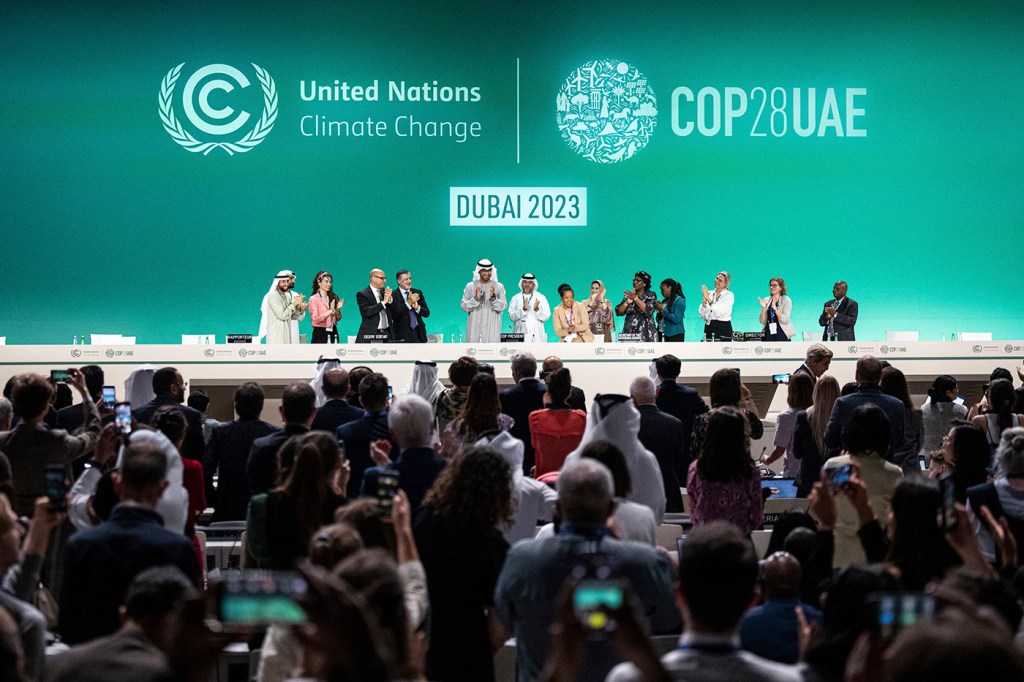‘Historic’ yet ‘disappointing’ COP28 agreement does not go far enough in fight against climate change, experts say

The COP28 climate conference ended Wednesday with an agreement to “transition away from fossil fuels.”
Climate change experts from Northeastern University say that does not go far enough.
“It is historic that there is a mention of fossil fuels; specifically, transitioning away from fossil fuels,” says Jennie Stephens, dean’s professor of sustainability science and policy at Northeastern. “But it’s disappointing that they didn’t decide to phase out or phase down fossil fuels.”
Laura Kuhl, assistant professor of public policy and urban affairs and international affairs, concurs.
“Apart from climate optimists and enthusiasm among the private sector, I don’t think there were many people who came away from this thinking this was a success,” Kuhl says. “If the final agreement were to be considered a success, it would only be in contrast to the absolutely abysmal draft text that was released a few days ago.”
For the past two weeks, negotiators representing around 200 countries at the United Nations climate summit in Dubai, United Arab Emirates, have hashed out how the world should address climate change and meet the target of limiting total global warming to 2.7 degrees Fahrenheit (1.5 degrees Celsius), compared to preindustrial levels. Scientists say that if warming exceeds that level, humans could struggle to adapt to rising seas, extreme weather and drought, and other effects of climate change caused by the burning of fossil fuels.
Neither Stephens nor Kuhl had high hopes for the talks. The UAE is one of the world’s main fossil fuel economies, the host of the conference is an oil executive, and a huge number of fossil fuel lobbyists attended the negotiations.
“The power dynamics here are really problematic — the countries that had most power and influence in negotiations are kind of reinforcing their interests,” Stephens says, citing the UAE, Saudi Arabia, United States and other fossil fuel producers. “That’s really insufficient and inadequate when looking at the climate emergency.”
But there were some positive steps.
It is historic that there is a mention of fossil fuels; specifically, transitioning away from fossil fuels. But it’s disappointing that they didn’t decide to phase out or phase down fossil fuels.
Jennie Stephens, dean’s professor of sustainability science and policy at Northeastern
First, even mentioning fossil fuels in the pact was considered a success.
“It’s explicit that fossil fuels are mentioned, as that is the crux of what the whole world is facing,” Stephens says. “They’re mentioned, and transitioning away from them is acknowledged as what countries need to do.”
But Stephens says the agreement is very “demand-sided.”
“A lot of climate policy has focused on the demand side: trying to reduce how much we use fossil fuels,” Stephens says. “The problem is that fossil fuels are so versatile and they’re being used all over the world in lots of different ways. Even if one university, community or city says they’re becoming fossil fuel free, they’ll be used somewhere else.”
Rather we should focus on the supply of fossil fuels, Stephens says.
“There needs to be a coordinated effort globally that we’re going to reduce, phase down and phase out the fossil fuel supply because, until that happens, emissions will continue,” Stephens says.
And that’s where the resolution falls short, although a phaseout of fossil fuels caused heated debate in the final days of the conference.
“I guess people are saying it’s showing the ‘beginning of the end’ of the fossil fuel economy by explicitly acknowledging the need for this transition,” Stephens continues. “But I think a fossil fuel phaseout is the next step and I think that in this COP more than any other, the reality of a fossil fuel phaseout and the inevitably that it will be coming, was very much more present than it has been previously and in previous years.”
Kuhl likewise saw some steps forward in the talks.
“From my perspective, the most exciting and biggest outcome of the negotiations actually happened on Day 1, and that was the approval of a new fund for loss and damage,” Kuhl said. “We’re acknowledging that when we don’t mitigate and don’t adapt to climate change, there will be damage, and suffering will occur.”
Kuhl calls the loss and damage fund the “third pillar of climate policy,” along with climate mitigation (reducing greenhouse gas emissions) and climate adaptation (dealing with the impacts of climate change). A Green Climate Fund already exists for climate adaptation and mitigation; in fact, Kuhl recently evaluated that fund in a paper featured in the journal Nature.
The loss and damage fund will be administered by the World Bank, and collects voluntary pledges from primarily wealthy, industrial nations to compensate the most climate-vulnerable countries from losses and damages due to climate change — for example, compensating for land lost due to sea levels rising, or paying for cleanup costs from worsening hurricanes.
Of course, there are major issues to be resolved — for instance, who can access the fund and what the fund can support. The fund also is not receiving nearly enough money in pledges to cover total loss and damages due to climate change — the United States’ $17.5 million pledge “has been very widely criticized as totally insufficient,” Kuhl noted.
Furthermore, it was pretty apparent leading up to COP28 that the loss and damage fund would be adopted, Kuhl said, so it didn’t really come as a surprise.
But it is a start.
Unfortunately, other financial commitments for helping climate-vulnerable, developing countries were elusive — and Kuhl, like Stephens, criticized the vagueness of the final resolution’s language.
“Developing countries were not OK with a phaseout of fossil fuels without a commitment that there was going to be financial support to help them transition away from fossil fuels and invest in renewable energy,” Kuhl said. “It was resolved with very weak language, that basically says there will be an eventual phaseout of fossil fuels that will account for climate justice.”
Cyrus Moulton is a Northeastern Global News reporter. Email him at c.moulton@northeastern.edu. Follow him on X/Twitter @MoultonCyrus.







